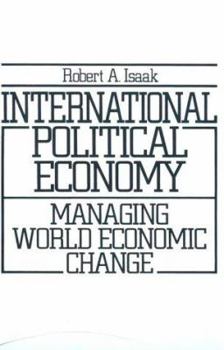International Political Economy: Managing World Economic Change.
An explanation of how global economic change is managed - with a focus on the interdependence of international political economy, international organizations, and international business. This description may be from another edition of this product.
Format:Paperback
Language:English
ISBN:013472366X
ISBN13:9780134723662
Release Date:January 1991
Publisher:Prentice Hall
Length:316 Pages
Customer Reviews
1 rating
'New view' to International Political Economy
Published by Thriftbooks.com User , 24 years ago
Considerable changes that took place after World War II have created a lot of consequences. The demand for economic reconstruction and the emerging of new countries (mainly in Asia and Africa) that released from colonialization are two of the changes that soon happened after the War. Not long after them, the following change appeared, namely, the emergence of non-state actors such as multinational corporations and international organizations (especially that operated in economic and trade area).Consequently, all of them made the world political landscape differ from it had used to be in pre-World War II. The world political landscape which had used to be dominated by security and military issues changed to be dominated by more various issues, especially economic. This picture was much realized by scholars of international relations. Therefore, they tried to redevelop a study of international political economy, a study that considers economic and politics as spheres that closely related.One of the scholars is Robert A. Isaak. He himself defines the study as a study of the inequality or asymmetry between nations and peoples and the collective learning and positioning patterns that preserve or change the asymmetry. Differ from other readers of international political economy, he has a specific analysis.In observing the phenomenon, he neither uses Marxist's point of view nor liberal's. He prefers a 'new view' to taking a side on one of them. His 'new view' is based upon what he called collective learning and positioning. In the essence, this view constitutes a process to differentiate patterns of appropriate adaptive behavior in facing changes without the abandonment of cultural identity.According to Isaak, the change forced an actor to keep his group from suffering a financial loss. from here, strategic behavior turn up. They are defeatist, free rider, maintenance, and entrepreneurial. These strategic behavior, in Isaak's opinion, have dominated 'struggle for power' in contemporary political/economy arena.Supported by strong information that happened behind the event and the use of wide range references, Isaak's explanation becomes very convincing. As a textbook in international political economy, this book is very recommended.






